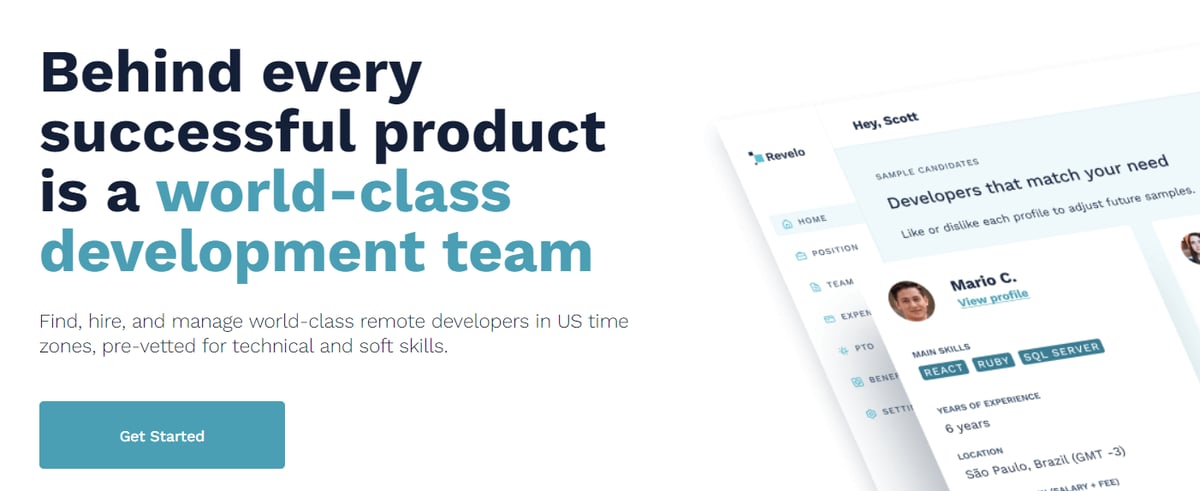Many employers want their workforce to have flexible working hours from home to balance their lives. As the remote work trend continues, many software developers wish to work remotely.
Hiring a candidate remotely for the first time can be challenging for the hiring team. It also depends on project requirements and the manager’s ability to lead a remote team. With careful planning, evaluation, validation, and decision-making, the organization may determine what is best for its productivity.
These substantial changes in working models bring about a question: should an organization hire remote software developers?
Moreover, hiring remote programmers can give developers advantages, while an organization can face challenges. Before making any decisions for the organization, carefully considering the benefits and drawbacks is necessary.
This article will discuss the benefits and drawbacks of employing a remote developer to assist your business in making the best choice.
Pros of Hiring a Remote Developer

Here are some of the benefits of hiring a remote developer.
No Commute
Employees who use the work-from-home model benefit from not commuting. No commute can reduce stress and improve work-life balance and job satisfaction. It also saves time, money, and energy.
Cost Savings
Remote developers usually have lower salaries than in-house developers. Employees working from home can save money on office expenses and other amenities. It makes remote hiring cost-effective for businesses and organizations. Research by TheStreet shows that companies saved $11,000 per employee when switching to remote work. In short, organizations save this money on office space and related resources.
Global Hiring
One of the main benefits of working with remote workers is having access to the best software engineers in all corners of the globe. Hiring remote coders enables employers to find competent software engineers outside their local location.
Productivity
Remote coders work more productively when working from home. They work more freely with open minds and foster creative ideas and input. Less interpersonal distractions and working in a suitable environment make the developer more productive with his code. According to Gallup’s research report, 35% of employees feel more productive when working remotely.
Avoid Office Politics
Every office’s ugly truth is internal politics. One of the best benefits of working from home is avoiding unnecessary gossip and politics. It also lets the workforce have constructive and purposeful interaction with their coworkers. Telecommuting tends to make working professionals less interactive and more productive.
Cons of Hiring a Remote Developer

Now, let’s check the cons of hiring a remote developer.
Security Concerns
Security concerns may be associated with remote work if not appropriately managed. Hiring a remote developer may expose you to security issues, including data leaks or unauthorized system access. Businesses can address these security concerns by offering vital tools and safeguards to remote workers to prevent cyber attacks and data theft.
Communication Gaps
The developers experience a communication gap with their teammates while working from home. These communication challenges occur due to a lack of face-to-face interaction, or maybe they are disconnected due to a lack of knowledge exchange with their peers.
Sometimes, differences may also arise due to language barriers. Mismatched expectations and a lack of communication also hamper the activities of the team members. It also ruins the product quality and interpersonal relations, bringing a lack of cohesion among the teammates.
The team leaders can fix this problem by regularly communicating with the team and finding out whether they have any issues at work.
Team Management
Managing a team of developers from afar may sometimes create chaos. The issue arises when a few team members are from different time zones. At such times, the developer may have to wait for his teammates from diverse time zones to log in.
Business leaders may sometimes lack trust in their employees due to the flexibility working from home offers. It also becomes difficult to monitor the team and their daily activities.
Companies can manage the development team’s operations using project management tools and cloud-based working models to fix this problem.
Employee Struggles
As a program analyst, working from home can sometimes be overwhelming due to the amount of work. Because of this, a developer who neglects to balance work and life may feel lonely or under stress.
They may also feel disconnected from their company due to prolonged remote work. Organizations often take developers for granted and burden them with never-ending work. Workload stresses the developer, bringing down his productivity and health.
Companies can overcome this problem by interacting with the team and distributing work evenly so that no team member struggles. For employees to feel connected to the company, like internal staff, they might also design interactive sessions.
When Should a Company Hire a Remote Developer?

An organization must hire a remote developer when it needs
- To Build a Diverse Team: A more diverse team leads to a more skilled workforce. A professional coding team can bring out a company’s best ideas and innovations. A company can hire a remote developer to build a strong development team that is tough to recruit locally.
- To Build a Team for a Startup: A startup can hire a remote developer to build up a team quickly on a budget. Usually, companies pay remote developers less than in-house developers.
- To Save Money: If a business wants to save money, it can hire a remote software developer, whether a startup or an enterprise. As mentioned above, companies pay less for remote developers than in-house programmers.
- To Meet Certain Demands: A firm may hire a remote software programmer to meet client demands or product growth.
- To Scale their Team: Scaling a team involves expanding the team without using additional time or resources while raising the company’s revenue. In short, it means a company wants to increase output without adding to the team. For such scenarios, a company can hire a remote coder.
- To Increase Market Size: A company may hire a remote programmer to enter new markets and need a specialized developer to understand a specific commodity or service.
Platforms to Hire Remote Developers

Here are a few platforms to hire remote developers:
#1. Toptal

Toptal is a platform that provides businesses and organizations with potential freelance software programmers. It is also a global network of technology, business, and design.
Toptal has world-class freelance developers with extensive corporate experience. It gives rigorous training to their freelance coders for these in-demand skills. In the year 2022, Topta served 21,000+ clients in 140+ countries. The recruiters for this company strive to find the best talent across the globe.
Top corporations rely on Toptal for their key efforts due to their thorough 2–5-week talent screening procedure and problem-solving mindset.
#2. Revelo

Revelo is a platform for recruiting that links businesses of all sizes with the top remote developers. This platform prioritizes Latin American talent with in-depth technical knowledge and works in US time zones.
Enterprises can also hire an entire development team to scale their needs with Revelo. It provides highly skilled, well-vetted, full-stack engineers across the globe.
Every applicant to this firm goes through a rigorous screening procedure that looks at their technical and soft skills and English fluency. When an organization discloses the candidate’s requirements, Revelo immediately starts sourcing pre-screened applicants.
Conclusion
Hiring a remote software engineer can offer many benefits, but managing a remote team can be challenging. Any organization hiring a remote developer must consider the pros and cons of working remotely. To integrate telecommuting, it also has to examine the project’s requirements, have clear expectations, proper communication tools, and policies for remote work.
You may also explore some best places to hire remote talent.

